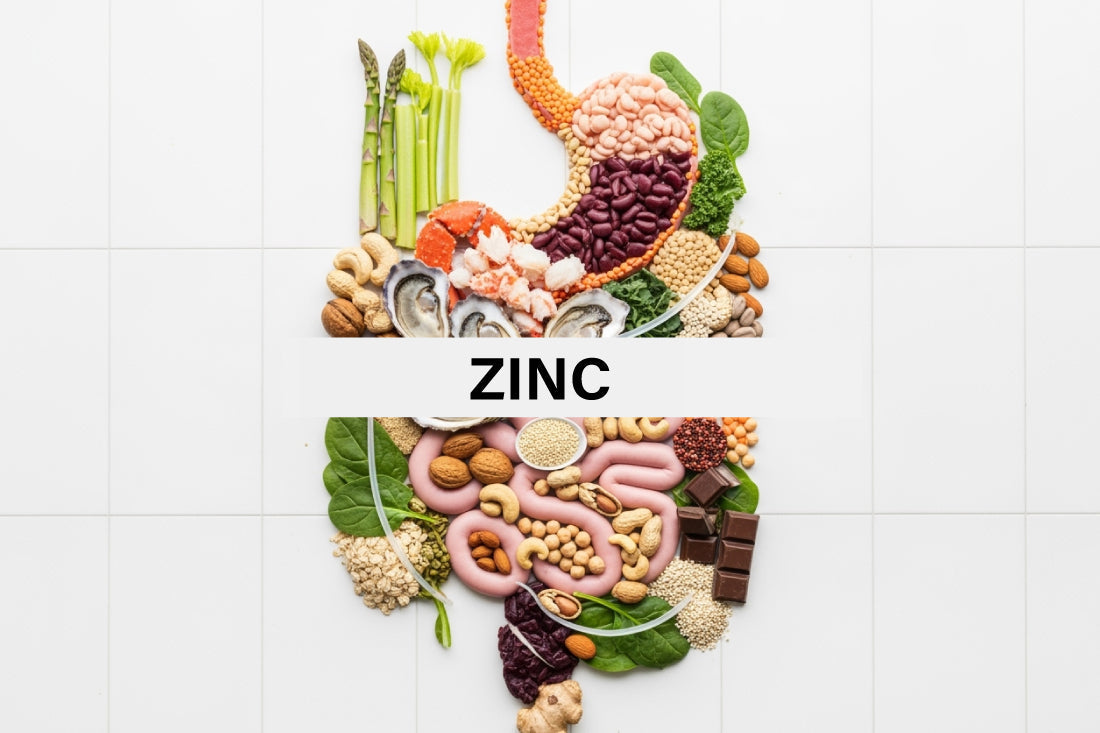Digestion is a natural process that allows the body to break down food into nutrients that fuel energy and daily activity. While many people know about vitamins and minerals that help with digestion, zinc often gets overlooked. Yet, zinc plays a very important part in keeping the digestive system functioning smoothly. From supporting enzyme activity to maintaining the sense of taste and smell, zinc has many hidden roles that make it essential for healthy digestion and overall wellness.
In this article, we will look at how zinc supports digestion, what foods supply it, how much is needed, and what happens when zinc intake is either too low or too high.
What is zinc’s role in digestion?
Zinc is a trace mineral, which means the body needs it in small amounts, but its impact is significant. One of the main roles of zinc in digestion is helping enzymes do their work. Enzymes help break down food into usable nutrients. Without enough zinc, the enzymes that support protein and carbohydrate digestion may not work properly, leading to discomfort or poor nutrient absorption.
Zinc also helps maintain the lining of the stomach and intestines. This lining acts as a barrier that allows nutrients to pass through while keeping out unwanted elements. In this way, zinc contributes to smoother digestion and nutrient absorption.
Another key role of zinc is linked to taste and smell. When zinc levels are low, the sense of taste and smell may not be sharp, which can affect appetite and interest in food. Appetite changes can indirectly disturb digestion, since eating less or irregularly often disrupts the digestive process.
How much zinc do you need?
The amount of zinc a person needs can vary with age, lifestyle, and dietary choices. In general, most adults require only a small but steady intake each day. Getting the right balance is important because both too little and too much zinc can cause discomforts.
Low zinc intakes may impact digestion and appetite, while excess zinc may disturb mineral balance in the body. High doses, especially from supplemental zinc, should be taken with care and only when advised. It is always best to aim for a balanced intake from food sources first, and then consider supplements if required.
What are the sources of zinc?
Zinc is found in a wide variety of foods. Animal-based foods such as poultry, seafood, and eggs are well-absorbed sources of zinc. For people who prefer a plant-based lifestyle, beans, lentils, nuts, seeds, and whole grains can supply zinc, though the body may not absorb it as efficiently from these sources. This is because certain plant compounds can slow zinc absorption.
How does the body absorb zinc?
Absorption of zinc happens mainly in the small intestine. Factors such as the type of food eaten, the presence of other minerals, and overall gut health can affect how well zinc is absorbed. Animal-based foods usually allow better zinc absorption compared to plant-based sources.
Supplemental zinc can be another option when diet alone does not meet needs. Zinc comes in different forms such as zinc monomethionine. Some forms may be easier for the body to absorb, and the choice often depends on individual needs and health goals.
How can Zinc supplements help?
When diet alone does not provide enough zinc, supplements may be considered. Choosing the right form and amount is important for safe use. Sandhu’s Zinc Quercetin supplement, combines zinc with quercetin, a plant flavonoid. This thoughtful pairing not only supplies zinc but also helps body’s immune system while supporting healthy digestion. For those following a plant-based lifestyle or those with busy routines, such supplements can be a practical way to maintain healthy zinc levels.
Conclusion
Zinc may be a small mineral, but its role in digestion is far-reaching. From helping enzymes break down food to supporting the stomach lining and maintaining the sense of taste and smell, zinc plays many silent but essential roles. Getting the right amount of zinc through balanced food choices and, when needed, supplements, helps maintain healthy digestion and overall wellness.
For individuals looking for extra support, especially where diet alone may not be enough, a trusted option such as Sandhu’s Zinc Quercetin can help meet daily zinc needs in a simple and effective way.






